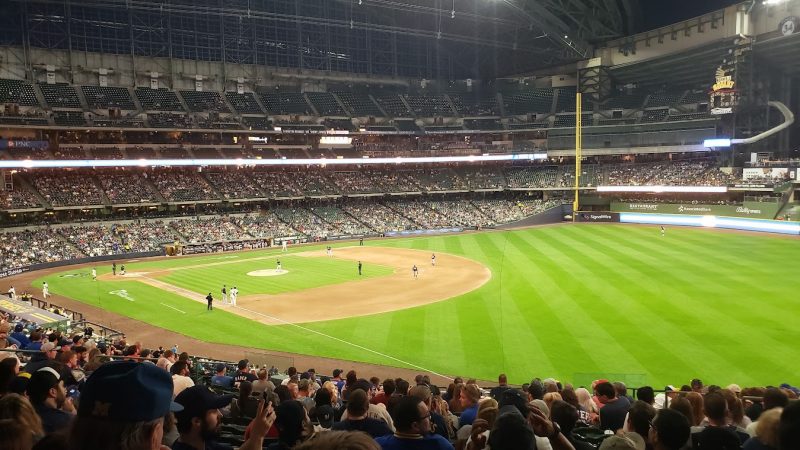Rep. Rob Brooks says the deal to fund Milwaukee Brewers ballpark maintenance will likely be amended to include a ticket tax and an audit of the current stadium board.
The Saukville Republican in an Assembly State Affairs Committee hearing at State Fair Park yesterday said he’s open to Senate amendments to the bill that aims to fulfill the state’s existing contract as stadium landlord to the Brewers and keep the team in Wisconsin through 2050.
Brooks added he predicts the deal will be amended to include a ticket tax on non-Brewer events such as concerts; and the deal would fund improvements to keep the stadium between 68 and 70 degrees during the winter.
But Brewers Business Operations President Rick Schlesinger recoiled at the idea of a ticket tax, arguing the team’s focus has always been on affordability, not increasing prices.
>> WisPolitics is now on the State Affairs network. Get custom keyword notifications, bill tracking and all WisPolitics content. Get the app or access via desktop.
“There’s not a demographic we don’t seek out to attract to go to the games,” he said. “And people of modest means who are dealing with inflation, dealing with having to work two jobs just to keep ends meet, I want them to be able to come to the game and have a great experience.”
Schlesinger didn’t specifically mention the non-Brewers event aspect of the ticket tax, but Rep. Marisabel Cabrera, D-Milwaukee, pressed him on his opinion on the non-Brewers event ticket tax.
Schlesinger said he doesn’t have authority to commit or not to a ticket tax, and “the devil is in the details.”
“I don’t want concerts and other non-baseball events to be elite-attended events,” he said. “I want the average person to be able to feel comfortable affording to come to those games and events.”
He also noted the team doesn’t collect revenue from concert tickets, they just get money from concessions, parking and other event facilitation work.
“I’m not crying poverty,” he said. “I just don’t want anybody to have this illusion that a concert that may generate $10 million of revenue; we’re getting a very relatively small percentage of it. But it’s obviously revenue that helps us.”
Schlesinger also said the winterization provision would create more opportunities to make more revenue by hosting events when it would otherwise be too cold. The project would also mean a lower heating bill in the winter, the ability to grow the grass earlier and engage baseball fans with the Brewers more often.
“I’d love to have a Brewers Fan Fest there,” he said. “I would love to have a monster truck [event]. Or my nephew wants wrestling — apparently that’s a big deal for a nine-year-old — but whether it’s small concerts or hockey or UW women’s volleyball … I’d love that.”
Brooks, charged by Speaker Robin Vos with leading the negotiations over the deal, also said in his talks with the Brewers they have expressed a desire to develop some of the land surrounding the stadium. He noted the redevelopment is not part of the legislation to keep the team in Wisconsin.
“Am I going to guarantee you development? No,” Brooks said. “Because that’s not my decision, that’s between the city, the county and the Brewers. And all three of them have agreed to come together to form a workgroup to see what can be done there.”
Schlesinger later gave hope to those who want to redevelop the expansive 16 surface lots that can accommodate more than 12,000 cars, saying he looks “forward to the working group and being very active in it.”
“And if it comes out to the working group that there is a pathway to get it done, I’m all in,” he said.
The new deal would also get rid of the existing stadium board’s 13 members and replace them with four picks from the governor, two from the Assembly speaker and two from the Senate majority leader.
Rep. Francesca Hong, D-Madison, raised concerns the current political makeup of the Senate, which must confirm any of the guv’s picks, could tilt the board in favor of the Republican-controlled Legislature.
The Senate has repeatedly blocked Evers’ appointees to various boards, notably the Natural Resources Board and UW Board of Regents.
Brooks said it’s hard to predict the future partisan makeup of the Legislature, and it would be difficult to come up with a number of board members that would address the problem for good. He also noted Evers gets four picks because he expects one or two to be local Milwaukee officials, giving the community the Brewers call home some stake.
Brooks also argued the current board isn’t all to blame for the current problems.
“You can’t pin that all on the stadium board. It’s a convenient thing, but they were under tremendous pressure to sunset,” he said. “The whole five-county tax, in my opinion, we probably did that a little prematurely.”
Brooks also said the board makeup and local contribution amount — currently $202 million from the city and $135 million from the county — “will likely change.”



